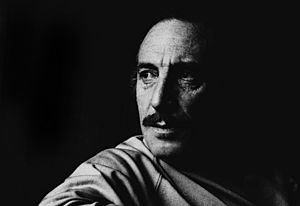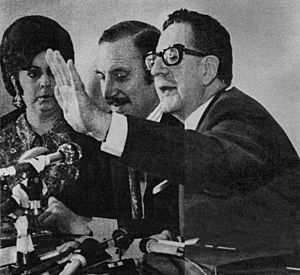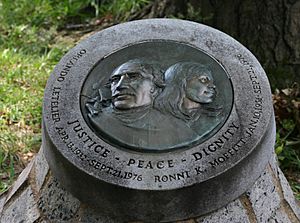Orlando Letelier facts for kids
Quick facts for kids
Orlando Letelier
|
|
|---|---|

Letelier in 1976
|
|
| Minister of National Defense of Chile | |
| In office August 23, 1973 – September 11, 1973 |
|
| President | Salvador Allende |
| Preceded by | Carlos Prats |
| Succeeded by | Patricio Carvajal |
| Personal details | |
| Born |
Sergio Orlando Letelier del Solar
13 April 1932 Temuco, Chile |
| Died | 21 September 1976 (aged 44) Washington, D.C., United States |
| Cause of death | Car bomb |
| Known for | Letelier case |
| Signature |  |
Orlando Letelier del Solar (born April 13, 1932 – died September 21, 1976) was an important Chilean leader. He worked as an economist, a politician, and a diplomat. A diplomat is someone who represents their country in another country. Letelier served during the time when Salvador Allende was president of Chile.
After a military takeover in Chile led by General Augusto Pinochet, Letelier had to leave his home country. He found new jobs in Washington, D.C., in the United States. In 1976, secret police agents from Pinochet's government killed Letelier in Washington. They used a car bomb to do this. These agents worked with a group that was against Fidel Castro, a leader from Cuba.
Contents
Early Life and Education
Orlando Letelier was born in Temuco, Chile. He was the youngest child of Orlando Letelier Ruiz and Inés del Solar. He went to the Instituto Nacional for his studies. When he was sixteen, he joined the Chilean Military Academy. He finished his high school studies there.
Later, he decided not to continue a military career. He did not finish college or get a university degree. In 1955, he started working at the Copper Office. This office was important for Chile's copper industry. He worked there as a research analyst until 1959.
On December 17, 1955, Letelier married Isabel Margarita Morel Gumucio. They had four children together: Cristián, José, Francisco, and Juan Pablo.
Letelier lost his job at the Copper Office. This happened because he had supported Salvador Allende in an election. After this, the Letelier family moved to Venezuela. In Venezuela, Orlando worked as an advisor on copper for the government.
Political Career in Chile

While he was at the university, Letelier was a student leader. In 1959, he joined the Chilean Socialist Party. This was a political party in Chile.
In 1971, President Allende chose Letelier to be Chile's ambassador to the United States. An ambassador is a country's official representative in another country. His main job was to explain why Chile was taking control of its copper mines. Before this, private companies, often from the United States, owned the mines.
In 1973, Letelier returned to Chile. He served as a government minister in different roles. He was the Minister of Foreign Affairs, then the Minister of the Interior, and finally the Minister of Defense.
Arrest and Exile
On September 11, 1973, there was a military takeover in Chile. This event is called a coup d'état. Orlando Letelier was one of the first high-ranking officials from Allende's government to be arrested.
He was held in different prison camps for twelve months. First, he was at the Tacna Regiment, then the Military Academy. After that, he was sent to a prison on Dawson Island for eight months. He was then moved to another military prison, and finally to the Ritoque camp.
Other countries and diplomats, especially Diego Arria from Venezuela, helped to get him released. In September 1974, he was set free. But he had to leave Chile right away.
After his release, Letelier and his family first went to Caracas, Venezuela. Later, they moved to the United States.
Life in the United States
In 1975, Letelier moved to Washington D.C. He became a senior researcher at the Institute for Policy Studies. This was a group that studied important issues. Letelier also became the head of the Transnational Institute in Amsterdam. He also taught at the American University in Washington, D.C.
Letelier wrote articles that criticized a group called the "Chicago Boys". These were economists who believed in a free-market economy. They advised General Pinochet in Chile. Letelier thought that in a country like Chile, a free market would make rich people richer and poor people poorer.
He became a leading voice against the Pinochet government. He worked to stop other countries, especially in Europe, from giving loans to the Chilean government. On September 10, 1976, the Chilean government took away his Chilean citizenship.
Letelier's Death

Orlando Letelier was killed by a car bomb on September 21, 1976. This happened in Sheridan Circle in Washington, D.C. His American co-worker, Ronni Karpen Moffitt, also died in the explosion. Ronni's husband, Michael Moffitt, was hurt but survived.
Several people were found guilty of the murders. These included Michael Townley, an American who worked for Chile's secret police (DINA). Also, General Manuel Contreras, who was the former head of DINA, and Brigadier Pedro Espinoza were convicted. Townley was jailed in the United States. Contreras and Espinoza were found guilty in Chile.
After Letelier's death, his funeral was held in Washington D.C. Many people, including American citizens and Chileans who had left their country, attended. Folksinger Joan Baez sang in his honor.
Diego Arria helped again by bringing Letelier's body to Caracas for burial. His body stayed there until 1994, after Pinochet's rule ended in Chile. General Augusto Pinochet died in 2006. He was never put on trial for the murders, even though there was evidence that he ordered them. After the assassination, the United States stopped giving military help to Chile.
Later Information
After Pinochet's death, the Institute for Policy Studies (where Letelier worked) asked for all secret documents about the assassination to be released. The US government had released many documents about Chile. However, they kept some documents about the Letelier-Moffitt murders secret. This was because the investigation was still ongoing.
The Institute for Policy Studies said that the US government had reopened the investigation. They sent agents to Chile to find more evidence that Pinochet had ordered the crime. Manuel Contreras, who was convicted for his part in the crime, later said that all orders came from Pinochet himself.
In 2015, more documents were released. A report from 1978 showed that the CIA knew Pinochet had ordered the murders. The report stated that Contreras told someone he authorized the assassination on Pinochet's orders. Other documents also showed that Pinochet was directly involved in ordering the killing and covering it up.
See also
 In Spanish: Orlando Letelier para niños
In Spanish: Orlando Letelier para niños
- Chile under Pinochet
- National Security Archive
- State terrorism
- Terrorism

